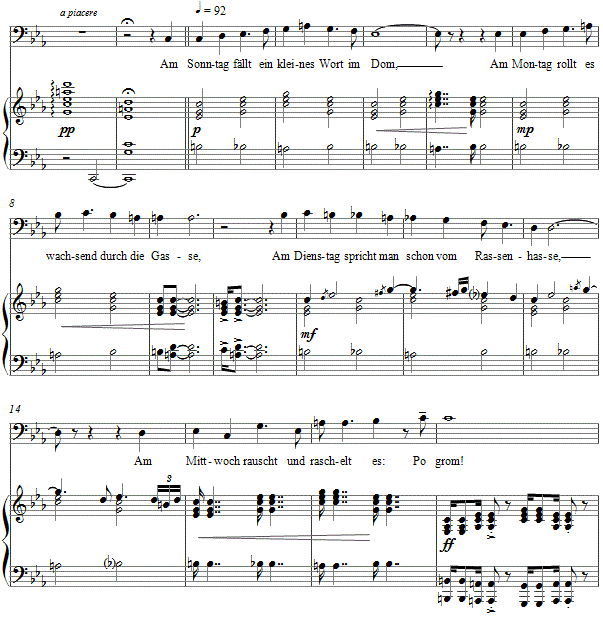Music and Texts of GARY BACHLUND
Vocal Music | Piano | Organ | Chamber Music | Orchestral | Articles and Commentary | Poems and Stories | Miscellany | FAQs
Pogrom - (2011)
Klabund
for baritone and piano
Am Sonntag fällt ein kleines Wort im Dom,
Am Montag rollt es wachsend durch die Gasse,
Am Dienstag spricht man schon vom Rassenhasse,
Am Mittwoch rauscht und raschelt es: Pogrom!
Am Donnerstag weiß man es ganz bestimmt:
Die Juden sind an Rußlands Elend schuldig!
Wir waren nur bis dato zu geduldig.
(Worauf man einige Schlucke Wodka nimmt...)
Der Freitag bringt die rituelle Leiche,
Man stößt den Juden Flüche in die Rippen
Mit festen Messern, daß sie rückwärts kippen.
Die Frauen wirft man in diverse Teiche.
Am Samstag liest man in der »guten« Presse:
Die kleine Rauferei sei schon behoben,
Man müsse Gott und die Regierung loben...
(Denn andernfalls kriegt man eins in die Fresse.)4 pages, circa 3' 20"
Klabund
Pogrom
On Sunday in the cathedral one whispers to some,
On Monday's streets are set in motion events to come,
On Tuesday people chatter and splatter race hatred noisome,
On Wednesday it rushes and rustles aloud: Pogrom!
On Thursday one is convinced, renewed, and so it grows:
The guilty Jews are the cause of all of Russia's woes!
Up to now we've been patient, they say, goodness knows.
(And for this more vodka into our people flows....)
On Friday is found that first corpse, resurrected,
One stabs in the ribs the Jewish curse suspected,
With sturdiest knives the vermin are best corrected.
One throws their women into ponds, as directed.
On Saturday one reads something of this in our "good" press:
The little dust up is already past, they do but confess,
And for this both our God and our state one must bless...
(Otherwise, just keep your trap shut about this mess.)
rhymed paraphrase by the composer
The simple, oppositional voices of the harmonic scheme make small arches, becoming more rhythmic and percussive as the strophes pass. The third stanza is a variant, after which the last strophe seems to repeat as the first -- a dark metaphor in music for recurring accusations which result in pogroms.
One notes this poem was written in the beginning of the twentieth century, well before the Holocaust created by National Socialism was begun much less known worldwide, telling with clarity yet with art as well the truth of anti-Semitism as was known in Russia and thereafter in the Union of Soviet Socialist Republics.
The word, pogrom, comes from the Russian through Yiddish, with two stems constructing the notion of destruction, "from po - like + grom - thunder" and most often applied to that destruction aimed against Jews in Tsarist Russia as in the Communist tyranny of Stalin which followed. That such pogroms and similar actions like the continuing accusations of blood libel may be seen today in condemnation enough that the world has not progressed very far after all. Rather, it seems to stutter along in circles revisiting the old errors and hatreds with a vengeance. Recent examples include such accusations as have been expressed in dredged up blood libel accusations in France as in the Middle East of recent, as well as in some "Occupy" protest demonstrations in the United States.
The score for Pogrom is available as a free PDF download, though any major commercial performance or recording of the work is prohibited without prior arrangement with the composer. Click on the graphic below for this piano-vocal score.

